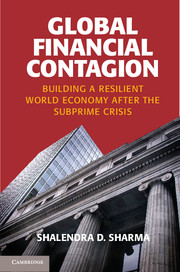Book contents
- Frontmatter
- Contents
- List of Figures
- List of Tables
- Acknowledgments
- Introduction
- One The United States
- Two The Bush and Obama Administrations’ Response
- Three From the U.S. to the European Crisis
- Four The Eurozone’s Sovereign-Debt Crisis
- Five Russia
- Six China
- Seven Japan, South Korea, and India
- Eight The Middle East amid the Global Financial Crisis
- Nine The Great Recession and the World’s Poorest
- Ten G-20 World
- Bibliography
- Index
Five - Russia
Not an Exceptional Country
Published online by Cambridge University Press: 05 June 2014
- Frontmatter
- Contents
- List of Figures
- List of Tables
- Acknowledgments
- Introduction
- One The United States
- Two The Bush and Obama Administrations’ Response
- Three From the U.S. to the European Crisis
- Four The Eurozone’s Sovereign-Debt Crisis
- Five Russia
- Six China
- Seven Japan, South Korea, and India
- Eight The Middle East amid the Global Financial Crisis
- Nine The Great Recession and the World’s Poorest
- Ten G-20 World
- Bibliography
- Index
Summary
Even as country after country in Eastern Europe, including in the former Soviet states, were succumbing to the financial contagion, Russia was deemed to be an exception to the rule. Hailed as an “economic miracle” (after notching impressive growth rates between 2000 and 2007), Russia was believed to have real immunity from the malaise plaguing its neighbors (Åslund, Guriev, and Kuchins 2010). Indeed, in September 2008, Prime Minister Vladimir Putin called Russia a “safe haven.” However, the notion of Russia’s immunity proved to be false after its economy contracted by some 7.8 percent. Why did the Russian economy succumb so quickly to the financial contagion? What does it tell us about the Russian economy – despite some two decades of market reforms? How can Russia better insulate itself from the vagaries of the global financial markets? The following sections address these interrelated questions.
Russia Is Not Like Eastern Europe
Many countries in Eastern Europe, including the former Soviet republics, began to feel the effects of the financial contagion long before Russia. This is because the markets woke up to the reality that these countries (like Iceland, Europe’s first victim of the crisis) were also living beyond their means. Like Iceland, Eastern Europe’s problems began with easy access to credit – the result of many countries, including Estonia, Latvia, Lithuania, Belarus, Ukraine, and Bulgaria, having pegged exchange rates. This attracted large inflows of short-term lending from Western European banks, which began to flood the region starting in 2004 (Martin 2010; Brixiova et al., 2010; Darvas 2011). By 2008, the thirteen former Soviet-bloc countries had accumulated a collective debt to foreign banks or in foreign currencies of more than U.S.$1 trillion (IMF 2009a; 2009b). The biggest lenders were Western European banks, in particular, Austrian and Italian banks (IMF 2008b; 2008c).
- Type
- Chapter
- Information
- Global Financial ContagionBuilding a Resilient World Economy after the Subprime Crisis, pp. 190 - 203Publisher: Cambridge University PressPrint publication year: 2013



